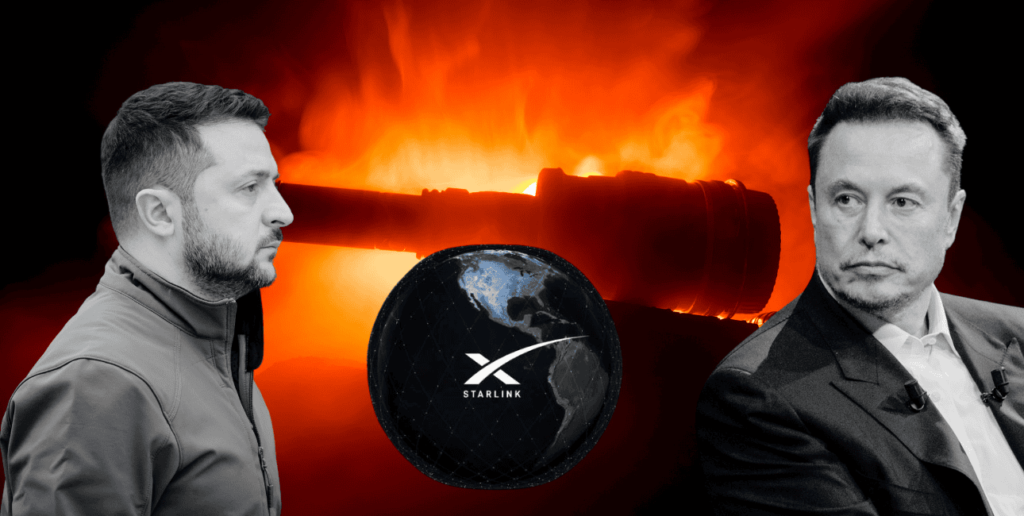A Strategic Standoff: Starlink and Ukraine’s Future at Risk
Ukraine’s access to Starlink, a vital tool for military and civilian communications, is now entangled in high-stakes geopolitical maneuvering. Reports suggest that the United States is pressuring Kyiv to agree to a lucrative mineral extraction deal in exchange for continued access to the satellite network. With Ukraine’s vast deposits of lithium, titanium, and rare earth elements at stake, the deal has sparked fierce debate.
Starlink: A Lifeline Under Political Pressure

Since the outbreak of the war, Elon Musk’s SpaceX has provided Ukraine with Starlink, ensuring uninterrupted communication for both frontline operations and essential infrastructure. The system’s reliability has made it indispensable, especially in war-torn regions where traditional networks have collapsed.
However, sources indicate that Washington is now leveraging Starlink access to secure long-term rights to Ukraine’s critical minerals. These resources are essential for global technology and defense industries, making them a prime target for U.S. interests. The dilemma for Ukraine? Agreeing to the deal could mean ceding control over a strategic economic asset, while refusal might result in Starlink service disruptions at a critical time.
Why Ukraine’s Minerals Matter to the U.S.
Ukraine boasts some of the richest untapped mineral deposits in Europe, including:
- Lithium (essential for batteries in electric vehicles and electronics)
- Titanium (vital for aerospace and defense industries)
- Rare Earth Elements (key components in high-tech and military applications)
With China currently dominating the rare-earth market, securing an alternative supply has become a priority for the U.S. A reported $500 billion deal has been on the table, but Kyiv has hesitated, wary of surrendering long-term resource control under external pressure.
A Tactical Move or Coercion?
The alleged U.S. move to link Starlink’s availability to the minerals agreement raises ethical and strategic concerns. Some analysts argue that tying military-critical infrastructure to economic deals sets a dangerous precedent. Others contend that it is a necessary move to counterbalance Russian and Chinese influence in the region.
For Ukraine, the stakes are enormous. On one hand, rejecting the deal could mean a disruption in Starlink access, potentially impacting military coordination, intelligence gathering, and emergency services. On the other hand, signing the agreement might come at the cost of economic sovereignty, leaving Ukraine vulnerable to external exploitation.
Elon Musk: Silent but Influential
Elon Musk, known for his unpredictable stance on geopolitical issues, has so far remained quiet on this latest controversy. However, his past actions indicate that he isn’t afraid to make unilateral decisions regarding Starlink’s usage in Ukraine.
[RELATED: Why Tech Titans are Racing to Arm the Pentagon with AI?]
Previously, Musk restricted the use of Starlink for offensive military operations, including Ukrainian drone strikes. This underscores a critical reality: while Starlink is a private enterprise, it operates within the broader framework of U.S. strategic interests. If Washington decides to enforce conditional access, Musk’s ability to resist may be limited.
Poland Steps Up: A Temporary Fix?
In an unexpected turn, Poland recently stepped in to fund Ukraine’s Starlink access, potentially providing a stopgap measure. While this offers short-term relief, it doesn’t resolve the underlying issue. If the U.S. insists on using Starlink as leverage, external funding may not be a sustainable solution.
What Happens Next?
As negotiations unfold, Ukraine finds itself in a difficult position. The decision could reshape the country’s economic and military trajectory for years to come.
- Will Ukraine bow to U.S. pressure to secure uninterrupted Starlink access?
- Could alternative communication solutions emerge to counterbalance Starlink’s strategic role?
- What are the long-term implications for resource sovereignty in war-stricken nations?
This geopolitical standoff is far from over, and the outcome could redraw the lines of power in both the tech and military landscapes. For now, Ukraine’s access to Starlink—and its control over its own natural wealth—remains in limbo.


